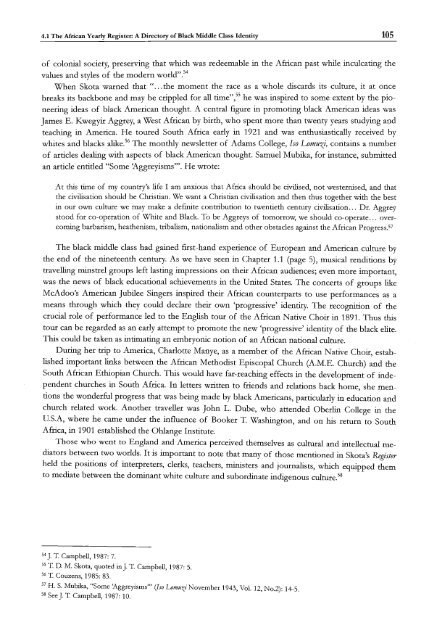South African Choral Music (Amakwaya): Song, Contest and the ...
South African Choral Music (Amakwaya): Song, Contest and the ...
South African Choral Music (Amakwaya): Song, Contest and the ...
Create successful ePaper yourself
Turn your PDF publications into a flip-book with our unique Google optimized e-Paper software.
4.1 The Mrican Yearly Register: A Directory ofBlack Middle Class Identity 105<br />
of colonial society, preserving that which was redeemable in <strong>the</strong> <strong>African</strong> past while inculcating <strong>the</strong><br />
values <strong>and</strong> styles of <strong>the</strong> modern world".54<br />
When Skota warned that " ...<strong>the</strong> moment <strong>the</strong> race as a whole discards its culture, it at once<br />
breaks its backbone <strong>and</strong> may be crippled for all time",55 he was inspired to some extent by <strong>the</strong> pioneering<br />
ideas of black American thought. A central figure in promoting black American ideas was<br />
James E. Kwegyir Aggrey, a West <strong>African</strong> by birth, who spent more than twenty years studying <strong>and</strong><br />
teaching in America. He toured <strong>South</strong> Africa early in 1921 <strong>and</strong> was enthusiastically received by<br />
whites <strong>and</strong> blacks alike. 56 The monthly newsletter of Adams College, Iso Lomuzi, contains a number<br />
of articles dealing with aspects of black American thought. Samuel Mubika, for instance, submitted<br />
an article entitled "Some 'Aggreyisms"'. He wrote:<br />
At this time of my country's life I am anxious that Africa should be civilised, not westernised, <strong>and</strong> that<br />
<strong>the</strong> civilisation should be Christian. We want a Christian civilisation <strong>and</strong> <strong>the</strong>n thus toge<strong>the</strong>r with <strong>the</strong> best<br />
in our own culture we may make a definite contribution to twentieth century civilisation... Dr. Aggrey<br />
stood for co-operation of White <strong>and</strong> Black. To be Aggreys of tomorro"l, we should co-operate... overcoming<br />
barbarism, hea<strong>the</strong>nism, tribalism, nationalism <strong>and</strong> o<strong>the</strong>r obstacles against <strong>the</strong> <strong>African</strong> Progress.57<br />
The black middle class had gained first-h<strong>and</strong> experience of European <strong>and</strong> American culture by<br />
<strong>the</strong> end of <strong>the</strong> nineteenth century. As we have seen in Chapter 1.1 (page 5), musical renditions by<br />
travelling minstrel groups left lasting impressions on <strong>the</strong>ir <strong>African</strong> audiences; even more important,<br />
was <strong>the</strong> news of black educational achievements in <strong>the</strong> United States. The concerts of groups like<br />
McAdoo's American Jubilee Singers inspired <strong>the</strong>ir <strong>African</strong> counterparts to use performances as a<br />
means through which <strong>the</strong>y could declare <strong>the</strong>ir own 'progressive' identity. The recognition of <strong>the</strong><br />
crucial role of performance led to <strong>the</strong> English tour of <strong>the</strong> <strong>African</strong> Native Choir in 1891. Thus this<br />
tour can be regarded as an early attempt to promote <strong>the</strong> new 'progressive' identity of <strong>the</strong> black elite.<br />
This could be taken as intimating an embryonic notion of an <strong>African</strong> national culture.<br />
During her trip to America, Charlotte Manye, as a member of <strong>the</strong> <strong>African</strong> Native Choir, established<br />
important links between <strong>the</strong> <strong>African</strong> Methodist Episcopal Church (A.M.E. Church) <strong>and</strong> <strong>the</strong><br />
<strong>South</strong> <strong>African</strong> Ethiopian Church. This would have far-reaching effects in <strong>the</strong> development of independent<br />
churches in <strong>South</strong> Africa. In letters written to friends <strong>and</strong> relations back home, she men<br />
tions <strong>the</strong> wonderful progress that was being made by black Americans, particularly in education <strong>and</strong><br />
church related work. Ano<strong>the</strong>r traveller was John L. Dube, who attended Oberlin College in <strong>the</strong><br />
U.S.A, where he came under <strong>the</strong> influence of Booker T. Washington, <strong>and</strong> on his return to <strong>South</strong><br />
Africa, in 1901 established <strong>the</strong> Ohlange Institute.<br />
Those who went to Engl<strong>and</strong> <strong>and</strong> America perceived <strong>the</strong>mselves as cultural <strong>and</strong> intellectual mediators<br />
between two worlds. It is important to note that many of those mentioned in Skota's Register<br />
held <strong>the</strong> positions of interpreters, clerks, teachers, ministers <strong>and</strong> journalists, which equipped <strong>the</strong>m<br />
to mediate between <strong>the</strong> dominant white culture <strong>and</strong> subordinate indigenous culture.58<br />
54]. T. Campbell, 1987: 7.<br />
55 T. D. M. Skota, quoted in]. T. Campbell, 1987: 5.<br />
56 T. Couzens, 1985: 83.<br />
57 H. S. Mubika, "Some 'Aggreyisms'" (Iso Lomuzi November 1943, Vol. 12, No.2): 14-5.<br />
58 See]. T. Campbell, 1987: 10.

















